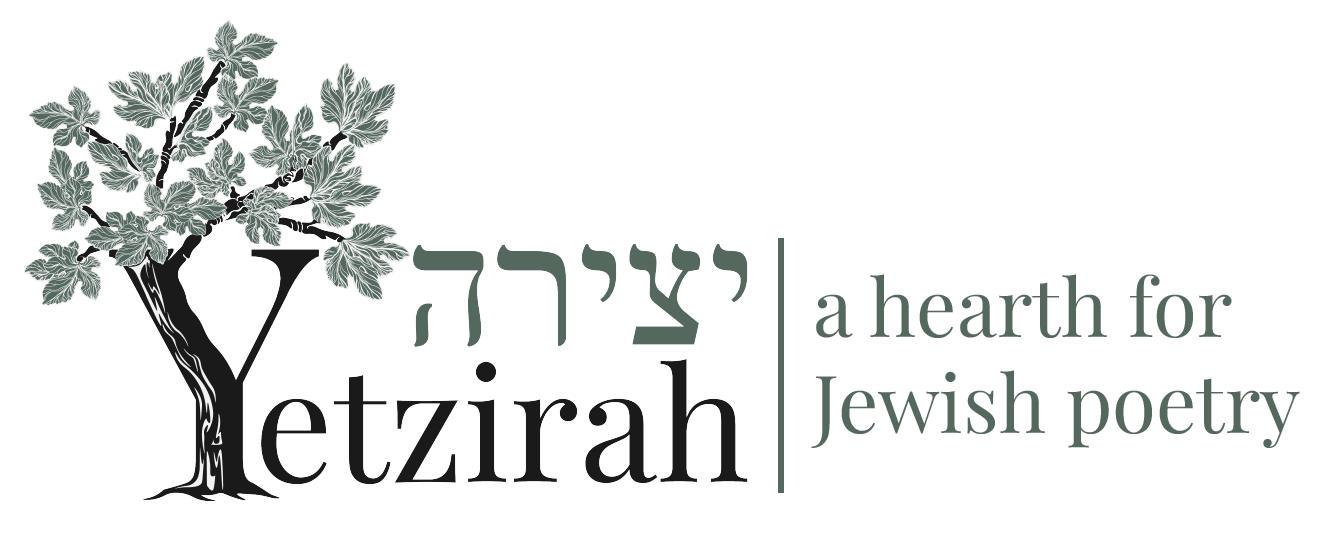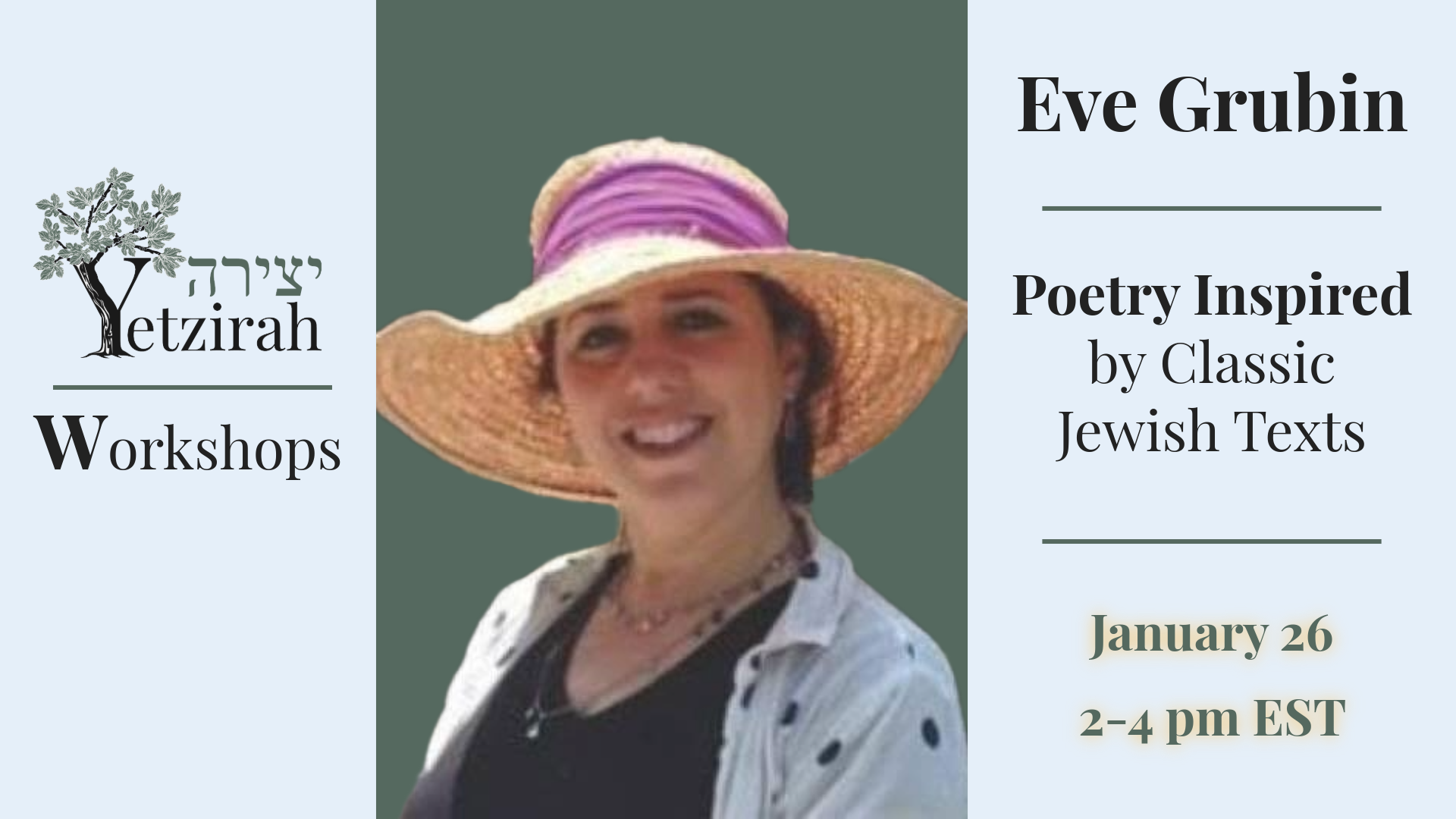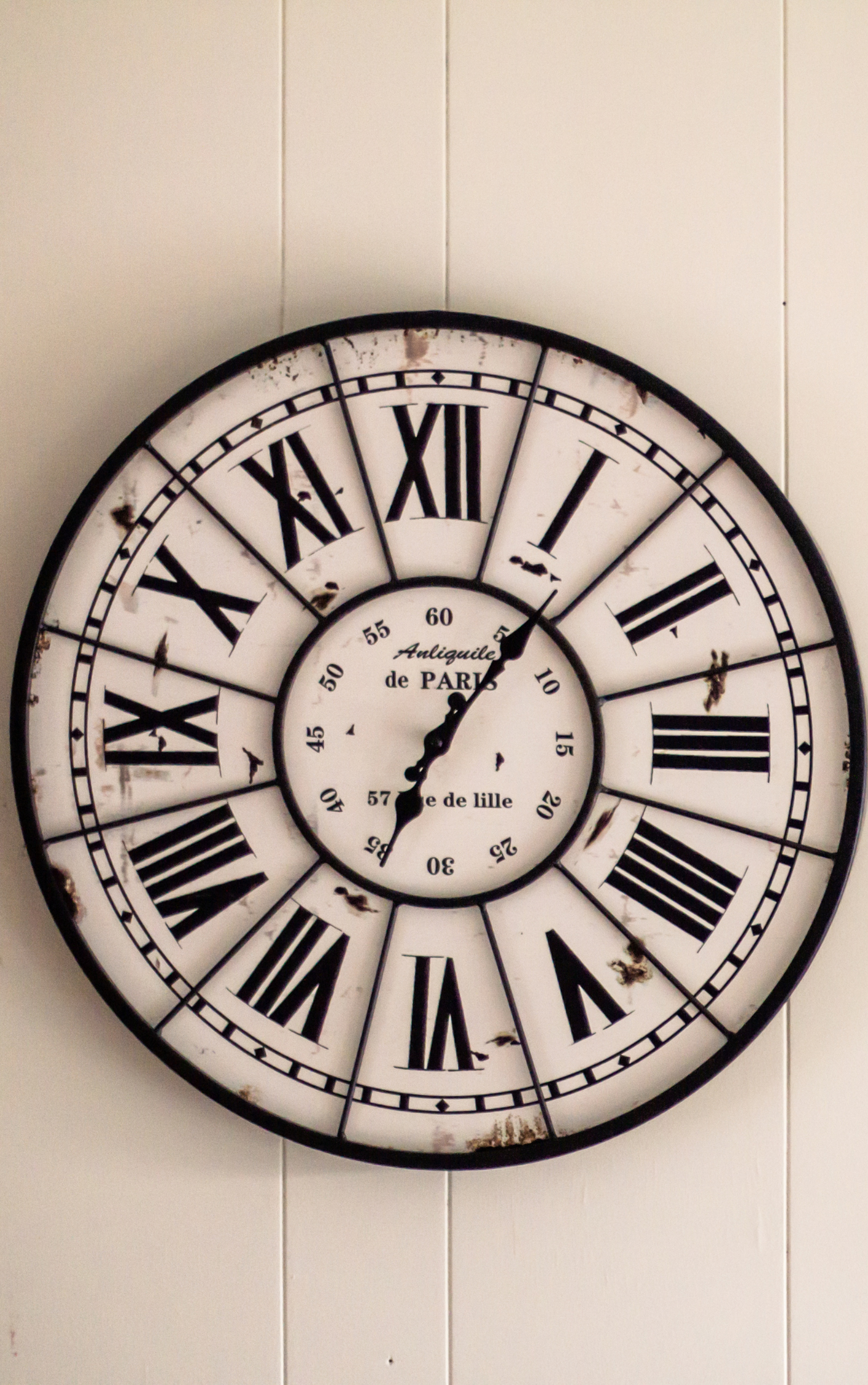Workshops
Study with some of today’s most dynamic poets, scholars, translators, theologians, and teachers. Our workshops are first offered live online via Zoom. Then, most of our courses are recorded and available asynchronously; so you can learn with our faculty any time.
KEEP UP TO DATE
You can subscribe to our mailing list here to stay up to date on all our announcements and make sure you’re able to register for capped classes before they fill!).
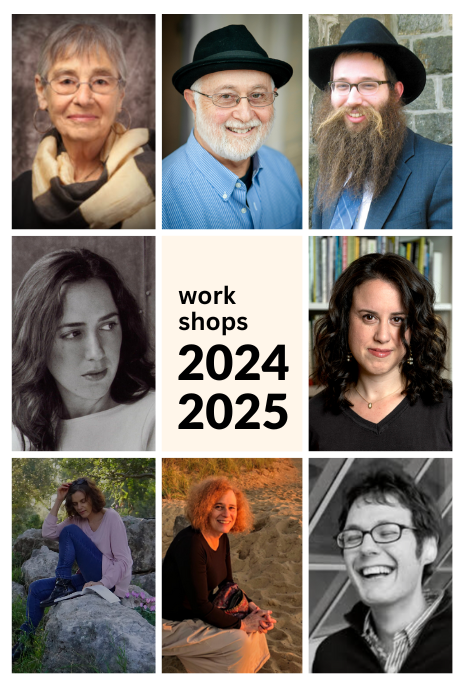
2025 Workshops
JANUARY 26, 2025
“Poetry Inspired by Classic Jewish Texts” with Eve Grubin
Description
In this generative workshop we will study and discuss a range of pre-selected passages from classical Jewish texts such as extracts from the Talmud, verses from the Hebrew Bible, and commentaries by medieval and later rabbis. We will then look at how poets have brought language or ideas from some of these texts into their poems. We’ll study poems by such poets as John Milton, John Keats, Dan Pagis, T.S. Eliot, Lucille Clifton, Sharon Olds, Marie Howe, Yehoshua November, and more. Finally, we will engage with these writings by beginning our own poems in response to them.
Workshop Dates & Cost
- January 26, 2025; 2-4 pm EST
- Handouts will be sent with the texts to be discussed
$72—standard registration
$60—18% discounted registration for Yetzirah Members (you can become a member here)
*As we want our offerings to be accessible to all, there is a pay-what-you-can option if this pricing is a hardship.
About Eve
Eve Grubin is the author of the collections of poems: Morning Prayer (Sheep Meadow Press, 2005), The House of Our First Loving, a chapbook, (Rack Press, 2016), and Grief Dialogue, a chapbook, (Rack Press, 2022). Her next book of poems, Boat of Letters, is forthcoming from Four Way Books. She teaches at NYU London and The Poetry School. More information can be found at www.evegrubin.com. Visit Eve’s profile in our Discover Jewish Poets database.
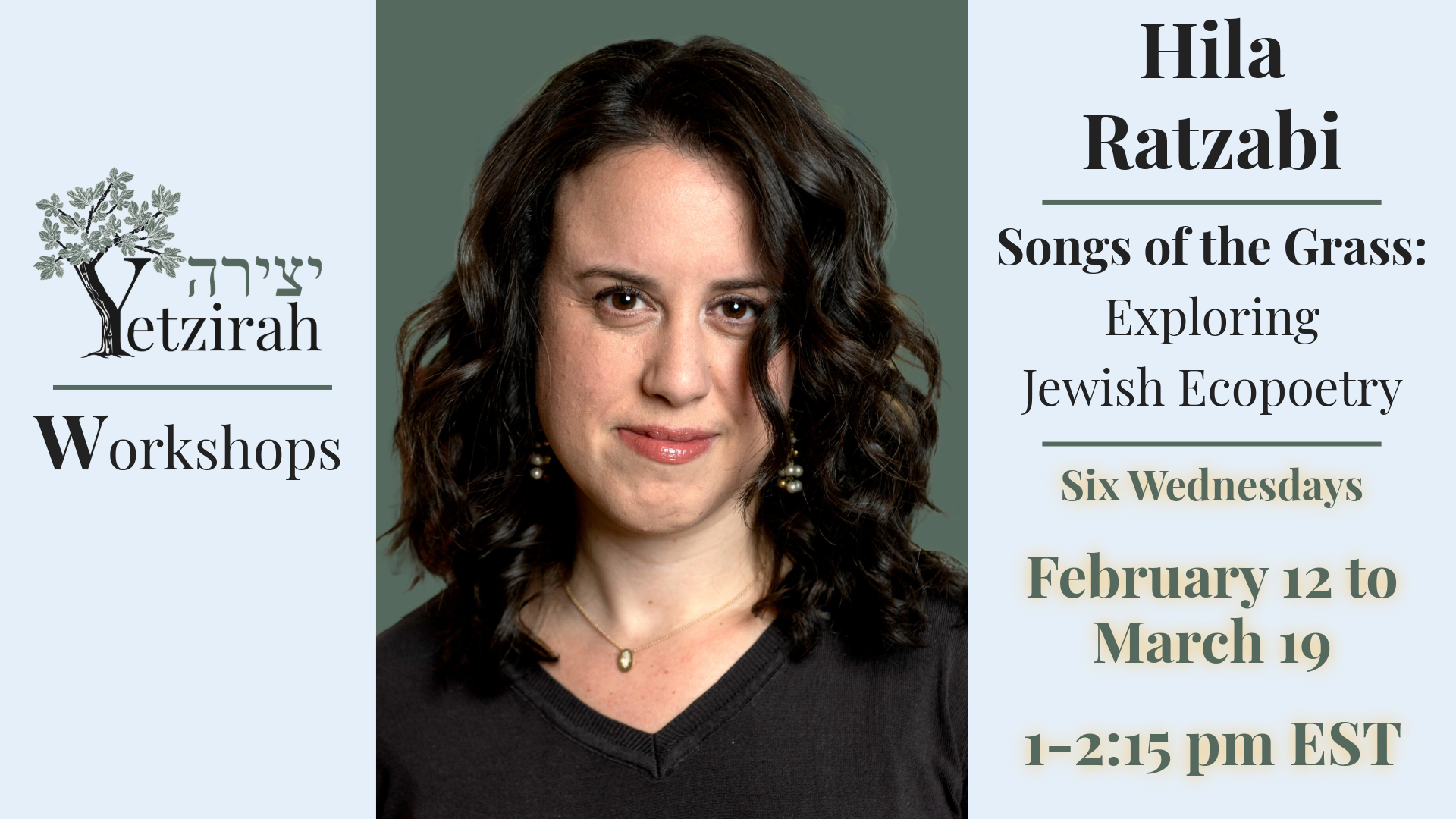
FEB. 12-MAR. 19, 2025
“Songs of the Grass: Exploring Jewish Ecopoetry” with Hila Ratzabi
Description
“Each and every grass has a song” – Rebbe Nachman of Bratslav
The Jewish environmental movement has sought to excavate and breathe new life into ancient texts that call us to right relationship with this fragile and holy earth. Jewish poets vividly describe the human encounter with plants, animals, and the elements where they often find intimations of the Divine or cause for protest on behalf of the non-human world. Together we’ll read poetry and other Jewish writings that will inspire our own experiments with ecopoetry. Some poets we will read include Marge Piercy, Muriel Rukeyser, Alicia Ostriker, Adrienne Rich, Denise Levertov, Stanley Moss, Stuart Kestenbaum, Phillip Levine, Mónica Gomery, and more! We’ll engage in writing exercises, some of which will take us outside to our local environments to allow us to listen to, and translate, the voices of the earth. You will come away with a deepened appreciation for Jewish wisdom on the environment and a number of poem drafts that will help you envision your personal Torah of the earth.
“Songs of the Grass: Exploring Jewish Ecopoetry was a powerful class for me to take when I was working on a project related to climate justice and responding with bravery to emotions around climate change. Looking at these issues through a Jewish lens added depth to my writing and thinking. Hila created a thoughtful and engaged community in the course, and sessions included rich discussion of source texts followed by writing exercises that were both generative and nourishing.”– Elisa McCool, previous participant in Songs of the Grass
Workshop Dates & Cost
- Six Wednesdays: 2/12, 2/19, 2/26, 3/5, 3/12, 3/19, 1:00 pm-2:15 pm EST.
- If you’re not able to attend a class, all classes will be recorded and available for later viewing
- Handouts will be sent with the texts to be discussed
$324—standard registration
$266—18% discounted registration for Yetzirah Members (you can become a member here)
*As we want our offerings to be accessible to all, there is a pay-what-you-can option if this pricing is a hardship.
About Hila
Hila Ratzabi’s first full-length book of poetry, There Are Still Woods (June Road Press, 2022), won a 2023 gold Nautilus Award and was a finalist for a National Indie Excellence Award. She was a finalist for the North American Review’s 2021 Terry Tempest Williams Prize in Creative Nonfiction, for the Fourth Genre Steinberg Essay Prize (2019), and for the Fifth Annual Narrative Magazine Poetry Contest (2013). She is the author of a poetry chapbook, The Apparatus of Visible Things (2009). Her poetry has been published in Narrative, Linebreak, Alaska Quarterly Review, The Adroit Journal, and other journals, and in The Bloomsbury Anthology of Contemporary Jewish American Poetry and Ghost Fishing: An Eco-Justice Poetry Anthology. She has received scholarships and fellowships to the Willapa Bay AiR residency, the Vermont Studio Center, the Crater Lake National Park residency, and the Arctic Circle Residency. Ratzabi is the former editor-in-chief and poetry editor of Storyscape and holds an MFA in Poetry from Sarah Lawrence College. She was director of virtual content & programs at Ritualwell.org (2015–2023). Ratzabi is currently director of communications at North Shore Congregation Israel in Glencoe, IL. She lives in Oak Park, IL, with her husband and two children. Visit Hila’s profile in our Discover Jewish Poets database.

FEBRUARY 23, 2025
“Translating Worlds, Exploring Words: A Workshop on Literary Translation” with Joanna Chen
Description
“A translation can serve as a lens into the underground life of another culture”
– Cynthia Ozick
Literary translation involves a deep reading of words; it is the natural companion of both reading and writing. The art and practice of literary translation enriches and informs our own writing. It provides a unique perspective on words we thought we knew, holding each one up to the light, examining it and deepening its presence.
In this generative workshop we will examine and explore translated poetry from Yiddish, Hebrew and other languages, opening doors to other worlds, both past and present.
Together we will discuss what translation means to us and how to approach it. We will experiment with our own translations of poetry, letting our love for language guide us. No prior experience necessary, all welcome.
Handouts will be sent with the texts to be discussed.
Each student will receive a written critique at the end of the workshop.
Workshop Dates & Cost
Handouts will be sent with the texts to be discussed.
Each student will receive a written critique at the end of the workshop.
- Sunday, 2/23, 1:00 pm-2:30 pm EST.
- If you’re not able to attend a class, all classes will be recorded and available for later viewing
- Handouts will be sent with the texts to be discussed
$72—standard registration
$59—18% discounted registration for Yetzirah Members (you can become a member here)
*As we want our offerings to be accessible to all, there is a pay-what-you-can option if this pricing is a hardship.
About Joanna
Joanna Chen’s full-length poetry translations include Less Like a Dove (Shearsman Books), Frayed Light (Wesleyan University Press, finalist for The Jewish Book Award),and but first I call your name (Shearsman Books). She is also the translator of My Wild Garden (Penguin/Random House) and Shooting in America (forthcoming with Penguin, winner of The Paper Brigade Award for New Israeli Fiction). Her work has been published in Asymptote, Waxwing, Mantis and La Piccioletta Barca, among numerous others. Her poetry, essays and interviews have been published in The Los Angeles Review of Books, The Washington Monthly, Lilith and Narratively, among several others. She teaches literary translation at The Helicon School of Poetry in Tel Aviv.
Asynchronous
Revisit our Past Workshops
Missed one of our live workshops? No problem! Explore our library of pre-recorded workshops, crafted by our expert poets and educators. Available anytime, these sessions allow you to deepen your skills and inspiration on your own schedule. Purchase access today and start your poetic journey when it works best for you!
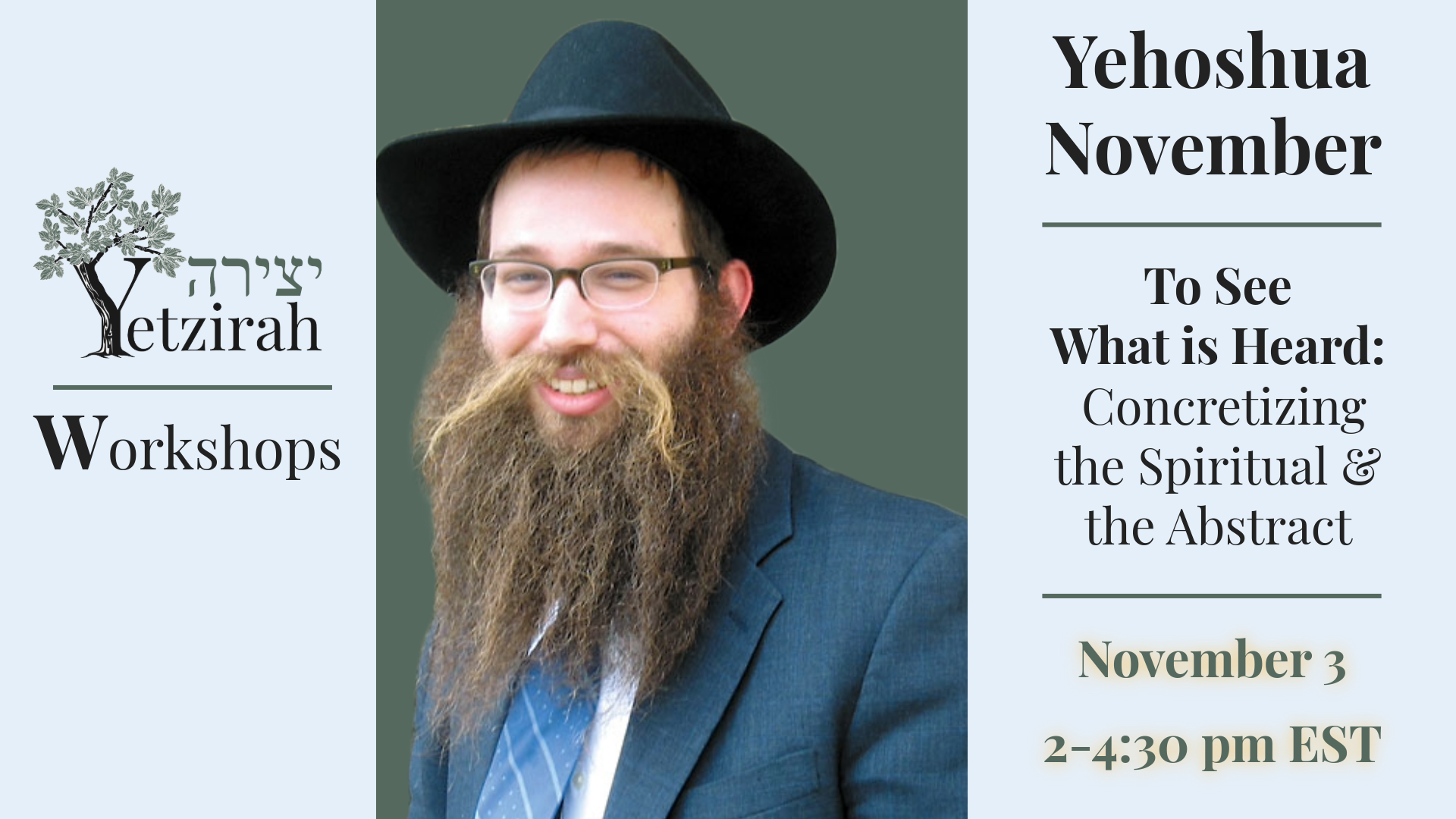
“To See What is Heard: Concretizing the Spiritual & the Abstract” with Yehoshua November
Description
In this generative workshop, we will look at a Hasidic mystical text that explores the relationship between imagery and abstraction during the watershed moment when the Torah was received at Mount Sinai. Then, taking our cue from Hasidic mysticism and contemporary poetry, we will attempt to harness the dynamic interplay of imagery and abstraction as we work toward generating several new poems.
Workshop Cost
- One recorded class
- Link to poems discussed in class
$36—standard registration
$30—18% discounted registration for Yetzirah Members (you can become a member here)
*As we want our offerings to be accessible to all, there is a pay-what-you-can option if this pricing is a hardship.
About Yehoshua
Yehoshua November is the author of God’s Optimism (a finalist for the Los Angeles Times Book Prize), Two Worlds Exist (a finalist for the National Jewish Book Award and the Paterson Poetry Prize), and The Concealment of Endless Light (Orison Books, 2024). His work has been featured in The New York Times Magazine, Harvard Divinity Bulletin, The Sun, VQR, TriQuarterly, and on National Public Radio and Poetry Unbound. November teaches creative writing at Rutgers University and Touro University and serves as mashpia, spiritual mentor, at Chabad of Teaneck. Visit Yehoshua’s profile in our Discover Jewish Poets database.
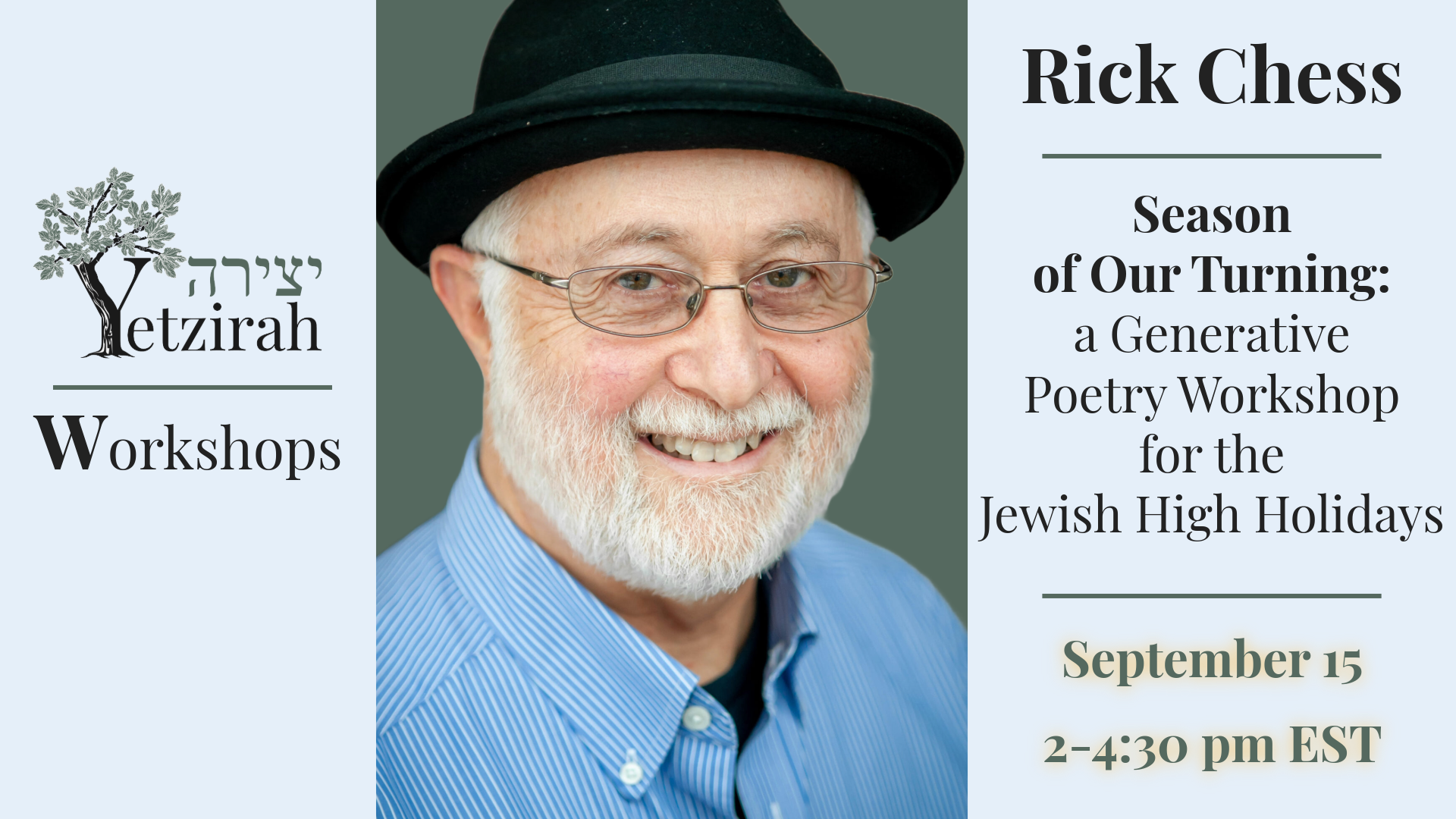
“Season of Our Turning: a Generative Poetry Workshop for the Jewish High Holidays” with Rick Chess
Description
“The word verse,” writes Edward Hirsch in A Poet’s Glossary, “is traditionally thought to derive from the Latin versus, meaning a ‘line,’ ‘row,’ or ‘furrow.’ The metaphor of ‘plough’ for ‘write’ thus dates to antiquity. Verse may alternately derive from the Latin vertere, ‘to turn.’”
Turning and returning: these are also essential moves for Jewish people, especially during the ten Days of Awe, bookended by Rosh Hashanah and Yom Kippur and preceded by the month of Elul on the Hebrew calendar. During this period, Jewish people are called upon to reflect on ways we have missed the mark–in our personal and communal lives–over the last year and to commit to redirecting our efforts to living in a way that is intended to be of benefit to ourselves and others. The process we engage in throughout the holiday season is called teshuvah, turning, or, as commonly translated, repenting.
In this exploratory, generative workshop, we’ll look at a few of the ways poems turn–from line to line, phrase to phrase, word to word, maybe even syllable to syllable. We’ll practice making similar turns in a few lines of our own. And we’ll invite ourselves to look for ways–subtle and bold–we might make some turns in our own lives as we head into the High Holiday period.
Richard Howard, as cited by Hirsch, has said, “process proceeds, verse reverses.” Through this workshop, in addition to writing and rewriting a few lines (who knows, maybe even a draft of an entire poem!) we may find an area in our lives which would benefit from a reversal.
Workshop Cost
-
- One recorded class
- Link to poems discussed in class
$36—standard registration
$30—discounted registration for Yetzirah Members (you can become a member here)
*As we want our offerings to be accessible to all, there is a pay-what-you-can option if this pricing is a hardship.
About Rick
Richard Chess is the author of four books of poetry, Love Nailed to the Doorpost (University of Tampa Press 2017), Tekiah (University of Georgia Press 1996; republished by University of Tampa Press 2000); Chair in the Desert (University of Tampa Press 2000); and Third Temple (University of Tampa Press 2006). His poems have been anthologized in Telling and Remembering: A Century of American Jewish Poetry, The Bloomsbury Anthology of Contemporary Jewish American Poetry, Bearing Witness: Twenty Years of Image Journal, and elsewhere. His work has also been included in Best American Spiritual Writing 2005. His essays have been included in Stars Shall Bend Their Voices: Poets’ Favorite Hymns and Spiritual Songs, 27 Views of Asheville, Far from the Center of Ambition, and elsewhere. New poems have recently been published or are forthcoming in The Sun, Pensive, Vita Poetica, and in Revisiting the Rothko Chapel, a book of scholarly and creative reflections on “the intersecting spiritual and aesthetic dimensions that give the Rothko Chapel its great power.” He is a regular contributor to Close Reading, the blog hosted by Slant Books. He was a member of the core arts faculty at the Brandeis Bardin Institute for three years, after which he was on the faculty of the Jewish Arts Institute at Isabella Freedman Jewish Retreat Center. He is Professor Emeritus at UNC Asheville. He directed UNC Asheville’s Center for Jewish Studies for 30 years. He also played a leading role in UNC Asheville’s contemplative inquiry initiative. He is the Treasurer of Yetzirah. Visit Rick’s profile in our Discover Jewish Poets database.
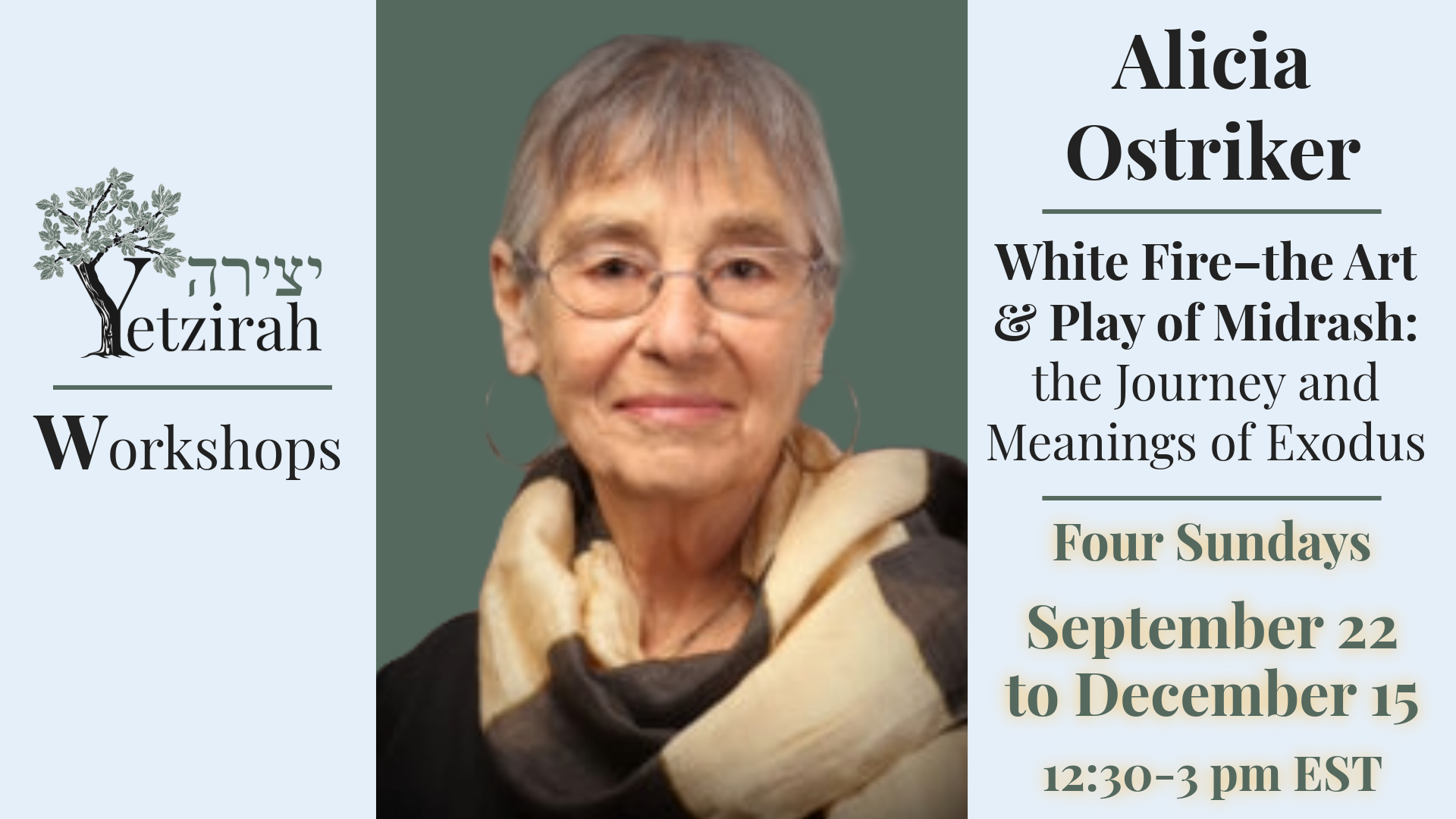
“White Fire–the Art and Play of Midrash: the Journey and Meanings of Exodus“ with Alicia Ostriker
Description
If the text does not apply to us it is an empty text…. We take the text in relation to ourselves, understanding ourselves in its light, even as our situation throws its light upon the text, allowing it to disclose itself differently, perhaps in unheard-of ways.–Gerald Bruns, “Midrash and Allegory: the Beginning of Scriptural Interpretation”
She is a tree of life to those that lay hold on her.–Proverbs 3:18.
Midrash (pl. midrashim) is from a term in Hebrew meaning seek or investigate.
Imagine that you are Eve. You have just had an interesting conversation with a talking serpent who insists that God doesn’t want you to eat the fruit of the Tree of Knowledge of Good and Evil because He is afraid you will become as one of the gods yourself. You regard the tree, and see that the fruit is attractive, good to eat, and good for making a person wise. You reach forth your hand, take the fruit, and eat. What do you feel at that moment? What are you thinking?
Imagine that you are Jacob. You are alone at night in the Negev Desert. Your family is on one side of the Jabbok river, and you are on the other, worrying. In the morning you will be meeting your brother Esau. You haven’t seen him for twenty years, not since you cheated him out of your father’s blessing and he threatened to kill you. Suddenly a man appears from nowhere and leaps on you, throwing you to the ground. He wrestles with you all night. He dislocates your thigh. Neither of you wins. As the sky lightens, the strange being says, “Let me go, for dawn is coming.” What are you feeling at that moment?
There are countless things the narratives of Torah don’t tell us. This is where midrash comes in. According to tradition, Torah is not words alone. Torah is black fire written on white fire. Through midrash, we imagine the unsaid. We read between the lines. We can see the connection between our ancestors and ourselves, and we can see that Torah is not only a very ancient Book–it is a totally modern one too. It mirrors our lives and the life of society, at least as well as any novel, and maybe better. As we enter the stories, the stories enter us, and both are changed forever.
The word has many meanings in Jewish history, but for poets, it means re-telling the compelling stories of Torah in every generation, in ways that are both personal and communal. For when we create new midrash in response to our own spiritual and psychic needs, we are simultaneously adding to and transforming our tradition, growing new twigs on the Tree of Life that is Torah, and helping to create the future of Judaism.
In these workshops, we explore biblical texts in free-form discussion, we write in response to prompts, we commonly astonish ourselves and each other by what we write, we laugh a lot, and sometimes we cry.
Workshop Cost
- 4 recorded classes with generative writing prompts
- Handouts with the texts discussed
$90—standard registration
$74—discounted registration for Yetzirah Members (you can become a member here)
*As we want our offerings to be accessible to all, there is a pay-what-you-can option if this pricing is a hardship.
About Alicia
Joanna Chen’s full-length poetry translations include Less Like a Dove (Shearsman Books), Frayed Light (Wesleyan University Press, finalist for The Jewish Book Award),and but first I call your name (Shearsman Books). She is also the translator of My Wild Garden (Penguin/Random House) and Shooting in America (forthcoming with Penguin, winner of The Paper Brigade Award for New Israeli Fiction). Her work has been published in Asymptote, Waxwing, Mantis and La Piccioletta Barca, among numerous others. Her poetry, essays and interviews have been published in The Los Angeles Review of Books, The Washington Monthly, Lilith and Narratively, among several others. She teaches literary translation at The Helicon School of Poetry in Tel Aviv.
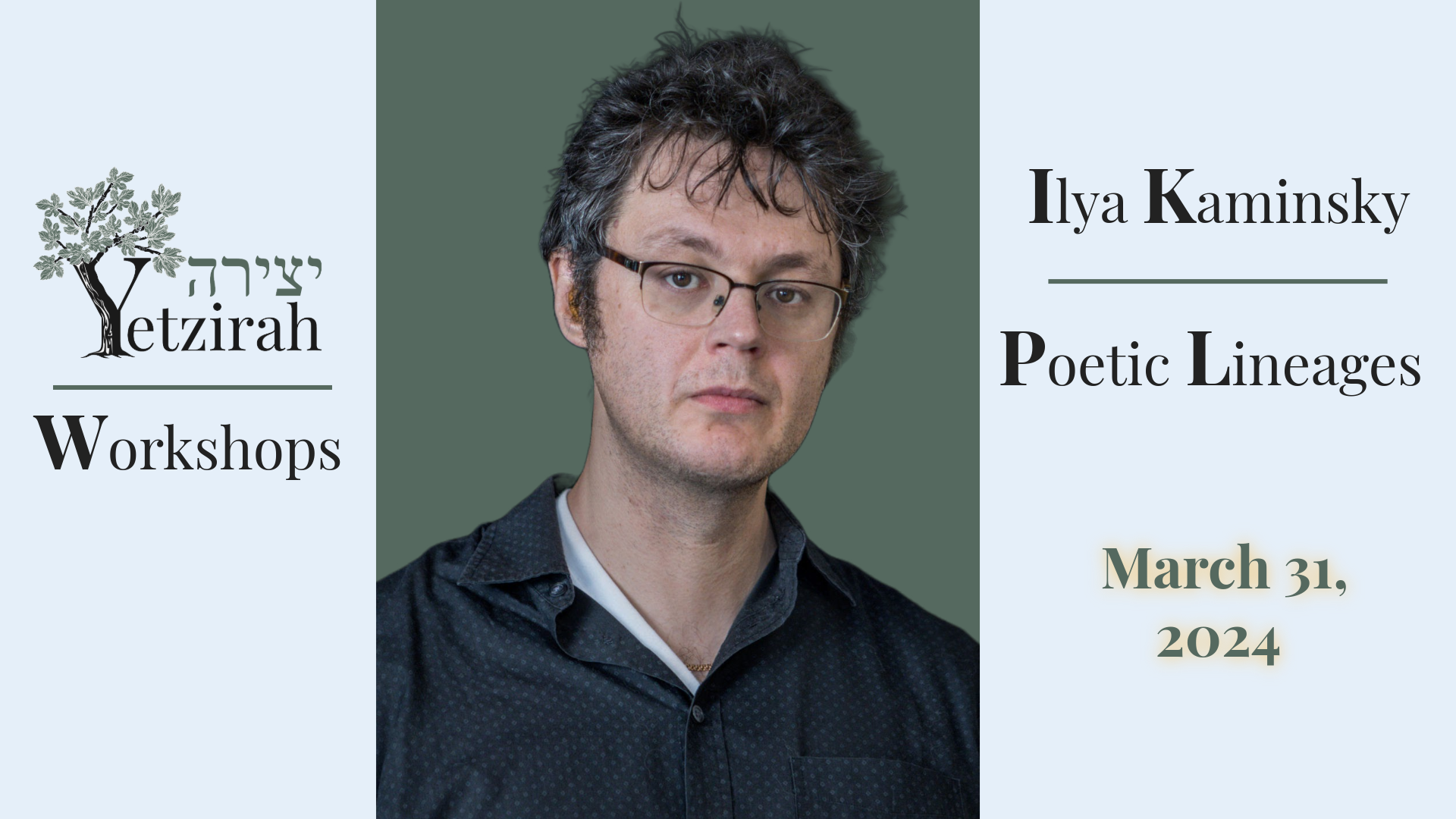
“Poetic Lineages” with Ilya Kaminsky
Description
We will read poems from Jewish poets of Eastern Europe and elsewhere and we will marvel together on the idea of poetic lineages: how do poets learn from other poets across time and geography? Is there such a thing as a poetics of diaspora? poetics of exile? How do poets enter in conversation with poets that came before them? How do poets bring back to life the authors who came before them and were (unjustly) forgotten? How can our own words grow and change as we overhear conversations between other poets, on and off the page? I hope that in our time together we will all ask impossible questions—and then try to answer them with unpredictable new lyrics.
This workshop is a modified version of the one Ilya taught at our 2023 Jewish Poetry Conference, to give you a taste of Yetzirah’s conference offerings.
Workshop Cost
-
- 1 recorded class (just under three hours)
- Handout with the texts discussed and the chat transcript
$36—standard registration
$30—discounted registration for Yetzirah Members (you can become a member here)
*As we want our offerings to be accessible to all, there is a pay-what-you-can option if this pricing is a hardship.
About Ilya
Ilya Kaminsky was born in Odessa, former USSR and came to USA in 1993 when his family was granted asylum by the American government. He is the author of Dancing in Odessa (Tupelo) and Deaf Republic (Graywolf) as well as co-editor of Ecco Anthology of International Poetry (Harper Collins), Homage to Paul Celan (Marick) and many other books. He has also translated books by Marina Tsvetaeva, Polina Barskova, Boris and Ludmila Khersonsky, among others. His work has received The Los Angeles Times Book Prize, The Guggenheim Fellowship, and was shortlisted for the National Book Award and National Book Critics Circle Award. Visit Ilya’s profile in Yetzirah’s Jewish Poets Database.
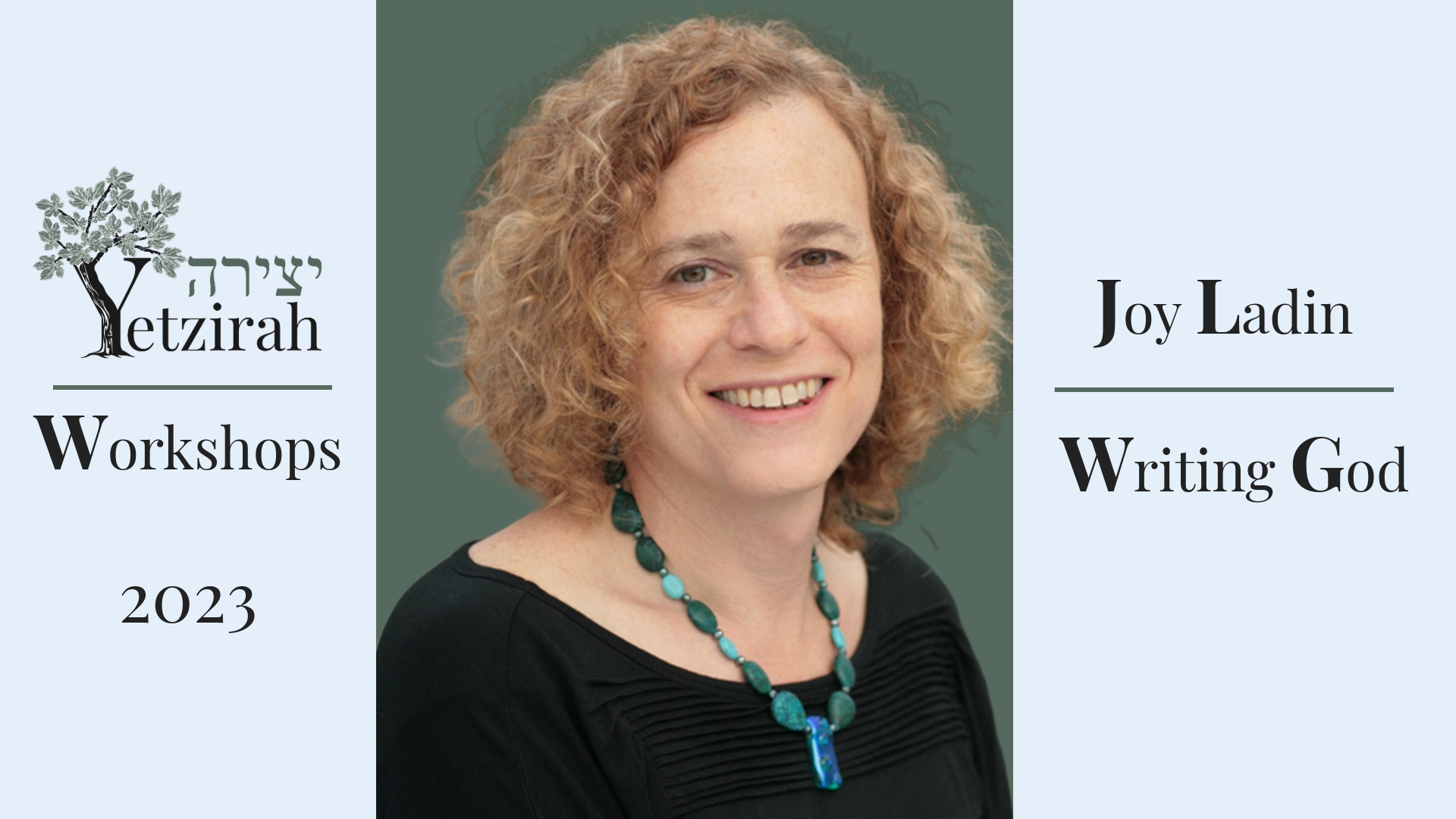
Telling the Soul’s Stories: Spiritual Anecdote & Autobiography
Description
Spiritual experience often feels private, isolating, uncommunicable. Spiritual autobiographies, from anecdotes to full-blown memoirs, use storytelling techniques to break down this sense of isolation, offering others glimpses of our own struggles and exaltations, and, more importantly, because readers interpret narratives by identifying with characters and projecting our own lives onto events in stories, turning our private experiences into stories through which others can recognize, reflect on, and be inspired in their own spiritual journeys. In this generative writing workshop we will look at examples of spiritual anecdote and autobiography, discuss the communicability and incommunicability of spiritual experience, and practice using midrash, haiku, and self-inventory to develop our own spiritual narratives.
Workshop Cost
- 3 recorded classes, followed by recorded Q&As
- handouts with representative texts and prompts to guide your writing
$72—standard registration
$59—discounted registration for Yetzirah Members (you can become a member here)
*As we want our offerings to be accessible to all, there is a pay-what-you-can option if this pricing is a hardship.
About Joy
Joy Ladin has published ten books of poetry, including National Jewish Book Award winner The Book of Anna, Lambda Literary Award finalists Transmigration and Impersonation, and newly published Shekhinah Speaks (Selva Oscura). She is also the author of a memoir, National Jewish Book Award finalist Through the Door of Life; and Lambda Literary and Triangle Award finalist The Soul of the Stranger. Visit Joy’s profile in Yetzirah’s Jewish Poets Database.
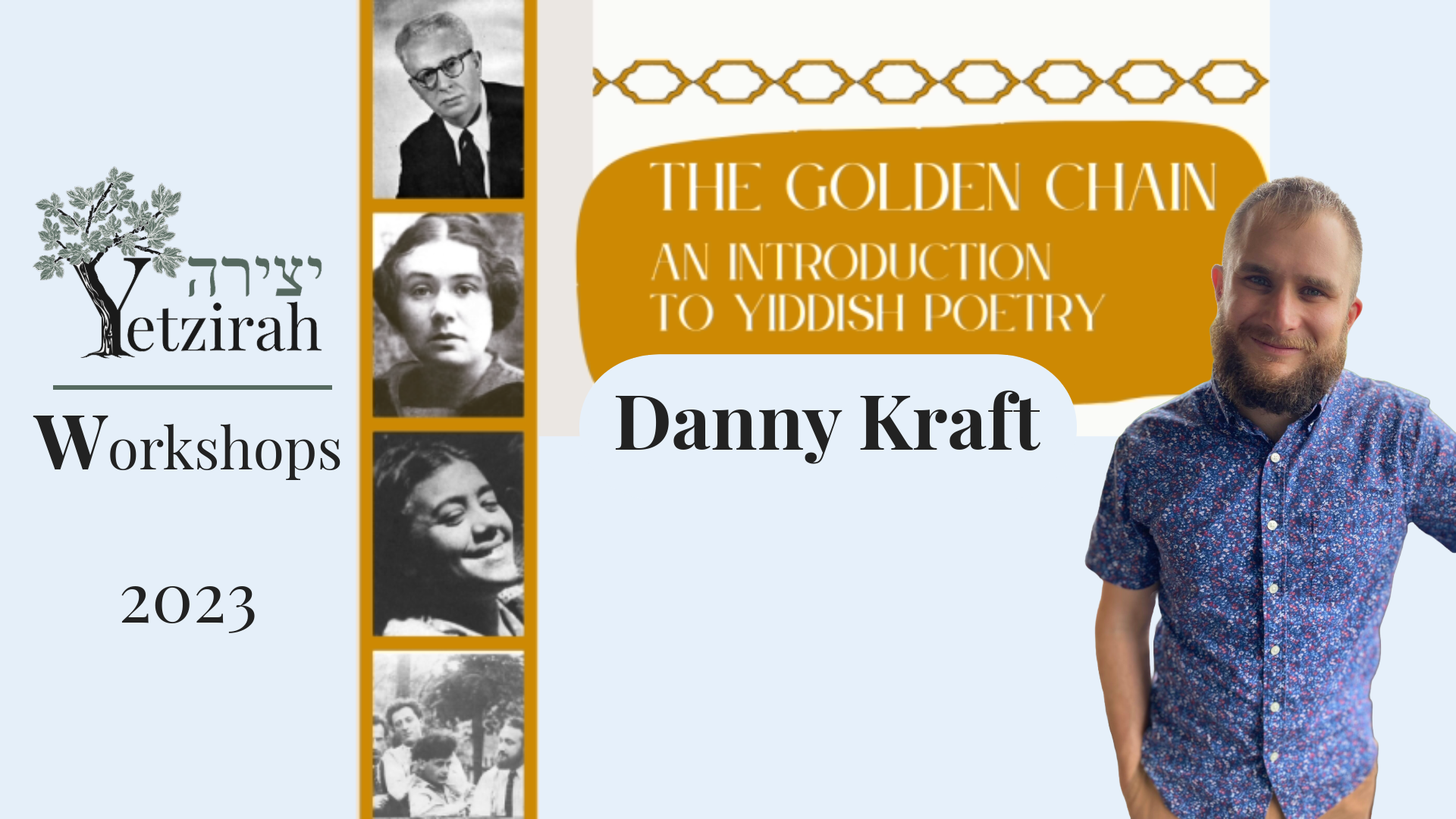
The Golden Chain: An Introduction to Yiddish Poetry
Description
Curious about Yiddish poetry? Eager to draw on Yiddish literature as inspiration for your own writing and art? No language or cultural background is required for this four-week, online course introducing the richness, beauty, and diversity of Yiddish poetry. Together we’ll read and discuss great Yiddish poems and writers, exploring the themes, contexts, and concerns of modern Yiddish poetry and their meaning for our own lives and labors.
Workshop Cost
- 4 recorded classes
- handouts with representative texts and prompts to guide your writing
$90—standard registration
$74—discounted registration for Yetzirah Members (you can become a member here)
*As we want our offerings to be accessible to all, there is a pay-what-you-can option if this pricing is a hardship.
About Danny
Daniel Kraft is a writer, poet, translator, and essayist. He holds a master’s degree in Jewish studies from Harvard Divinity School, where he was a resident at the Harvard Center for the Study of World Religions. His poems and essays appear in a number of publications including Image, Jewish Currents, EcoTheo Review, and Peripheries; his translations of Yiddish, along with brief personal and critical essays, can be found in his newsletter, Di Freyd Fun Yidishn Vort/The Joy of the Yiddish Word. In addition to writing and translating, Daniel has worked as a full-time Director of Education at synagogues across the American South, and as an educator at the Galicia Jewish Museum in Krakow, Poland. Visit Danny’s profile in Yetzirah’s Jewish Poets Database.
BECOME A MEMBER
Your membership support enables Yetzirah to produce our annual in-person Jewish Poetry Conference, online reading series, Discover Jewish Poets database, media archive, resource-rich website, and other free programs that champion Jewish poets and Jewish poetry. Receive members-only perks and support Yetzirah’s programming.
